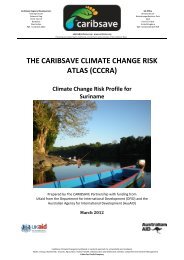You also want an ePaper? Increase the reach of your titles
YUMPU automatically turns print PDFs into web optimized ePapers that Google loves.
greater burden of care as poorer households tend to have more children, <strong>and</strong> possibly less resources to<br />
meet dem<strong>and</strong>s (Kairi Consultants Limited, 2000a).<br />
4.8.2. Vulnerability of Livelihoods, Gender, Poverty <strong>and</strong> Development to Climate<br />
Change<br />
Vulnerability in the context of climate change is a function of the level of exposure to climate change<br />
related or induced events, the level of sensitivity to these events <strong>and</strong> the capacity to adapt. Climate <strong>and</strong><br />
hydrological variability have both short <strong>and</strong> long term manifestations at the global scale, <strong>and</strong> is more often<br />
compounded by micro- <strong>and</strong> meso-scale human activities <strong>and</strong> impacts. The observed <strong>and</strong> predicted impacts<br />
of climate change are widely acknowledged in science <strong>and</strong> non-science circles, including communities who<br />
depend on natural resources.<br />
Climate-sensitive or natural resource intensive livelihoods are very vulnerable to climate change impacts<br />
because they depend so much on the stability of climate conditions or resources. Groups predisposed to<br />
vulnerability include women, children <strong>and</strong> the nation’s poor, owing to their lack of access to resources <strong>and</strong><br />
opportunities which translates into low resilience <strong>and</strong> exposes them more to climate change impacts than<br />
other groups.<br />
Poverty is an important factor in vulnerability, <strong>and</strong> climate change <strong>and</strong> poverty are inextricably linked,<br />
particularly as the poor are <strong>and</strong> will continue to be the most affected. The impacts of climate change<br />
undeniably aggravate the issue of poverty in all societies, <strong>and</strong> especially where poverty is extreme <strong>and</strong><br />
widespread (Figure 4.8.1 highlights some of these impacts). The areas where impoverished persons reside<br />
are more often at greater risk when compared to areas inhabited by stronger economic groups, particularly<br />
remote rural <strong>and</strong> coastal areas which are disconnected from essential services <strong>and</strong> resources.<br />
The North <strong>and</strong> Middle <strong>Caicos</strong> Isl<strong>and</strong>s (<strong>and</strong> to a lesser extent, South <strong>Caicos</strong> <strong>and</strong> Gr<strong>and</strong> Turk isl<strong>and</strong>s) have<br />
large percentages of poor persons, roughly ranging between 33% <strong>and</strong> 60% of any given isl<strong>and</strong>’s population.<br />
Providenciales has one of the lowest poverty rates by isl<strong>and</strong> amongst the different isl<strong>and</strong>s, despite that –<br />
with a growing percentage of the nation’s population living on the isl<strong>and</strong> – a third of the entire nation’s<br />
poor resides on Providenciales. The growth of tourism has boosted job creation with the establishment of<br />
several properties <strong>and</strong> supporting business/services in the area. However, the other isl<strong>and</strong>s do not have<br />
similar opportunities in the job market, <strong>and</strong> therefore have a greater proportion of residents who are<br />
unable to escape poverty by means of employment. Consequently, during the passage of Tropical Storm<br />
Hanna <strong>and</strong> Hurricane Ike in 2008, the poorest residents were some of the hardest hit.<br />
The impacts <strong>and</strong> aftermath of extreme weather events (e.g. flooding, drought, loss of l<strong>and</strong>s <strong>and</strong> crops) <strong>and</strong><br />
SLR (e.g. coastal erosion, salt water intrusion) deteriorate an already dire situation <strong>and</strong> leave persons in<br />
poverty with even less resources to survive (Kettle et al., n.d.). Conversely, climate change itself <strong>and</strong> the<br />
impacts it presents are also augmented by these same conditions of poverty, where the lack of access to<br />
resources <strong>and</strong> services almost dictates unsustainable environmental practices for survival (e.g. intense use<br />
of fossil fuels which promotes deforestation <strong>and</strong> contributes to GHG emissions, mismanagement of<br />
agricultural l<strong>and</strong> <strong>and</strong> resources which encourages soil erosion, <strong>and</strong> decline in quality <strong>and</strong> output) (UNFPA,<br />
2007; Kettle et al., n.d.).<br />
95





